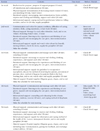Abstract
Purpose
This study was conducted to evaluate the effect of a social support program on family caregivers' role strain in elderly long-term home care.
Methods
The research adopted a non-equivalent control group pretest-posttest design. The number of participants was 25 in the experimental group and 25 in the control group sampled among family caregivers in elderly long-term home care. The experimental group participated in a 10-session social support program, which consisted of physical, emotional, informational, and material support. The effect of the program was evaluated by measuring family caregivers' role strain.
Figures and Tables
References
1. Statistics Korea. 2010 life tables for Korea [Internet]. Seoul: Statistics Korea;2011. cited 2012 January 10. Available from: http://kostat.go.kr/portal/korea/kor_nw/3/index.board?bmode=read&aSeq=252533.
2. Statistics Korea. 2010 health insurance review & assessment service for Korea [Internet]. Seoul: Statistics Korea;2011. cited 2012 January 10. Available from: http://hira.or.kr/common/dummy.jsp.
3. Park HK, Park KM. Factors influencing the burden felt by main family caregivers of elderly patients with brain and spinal diseases. J Korean Acad Community Health Nurs. 2011; 22(4):389–398.

4. Statistics Korea. 2011 national health insurance service for Korea [Internet]. Seoul: Statistics Korea;2011. cited 2012 January 16. Available from: http://nhic.or.kr/portal/site/main/menuitem.
5. Collins CE, Given BA, Given CW. Interventions with family caregivers of persons with Alzheimer's disease. Nurs Clin North Am. 1994; 29(1):195–207.
6. Lee SS, Lee KJ. The stress, social support and psychological well-being of the elderly. J Korea Gerontol Soc. 2002; 22(1):1–20.
7. Park YH, Yu SJ, Song MS. Caregiver burden of families with stroke patients and their needs for support group intervention. J Korean Acad Adult Nurs. 1999; 11(1):119–134.
8. Park JY, Kim YS, Kim KB. The effects of physical activity on loneliness and depression in the elderly people. J Korean Soc Study Phys Educ. 2002; 6(2):177–186.
9. Sung MS, Jang HJ, Lee KW, Kim YI. The development and effect of a CD ROM based caring program for the family caregivers among the Korean demented elderly. J Korean Soc Med Inform. 2001; 7(1):45–55.
10. Yoo GS. A study on a coping method of the family caregivers of demented patients. J Korean Acad Community Health Nurs. 2002; 13(4):648–667.
11. Zarit SH, Todd PA, Zarit JM. Subjective burden of husbands and wives as caregivers: A longitudinal study. Gerontologist. 1986; 26(3):260–266.

12. Suh MH, Oh KS. A Study of well-being in caregivers caring for chronically Ill family members. J Nurs Acad Soc. 1993; 23(3):467–486.

13. Rodolfa ER, Hungerford L. Self-help group: A referral resource for professional therapists. Prof Psychol. 1982; 13(3):345–353.
14. Oh KS, Seo MH, Lee SO, Kim JA, Oh KO, Jung CJ, Kim HS. Search for the meaning of social support in Korean society. J Nurs Acad Soc. 1994; 24(2):264–277.

15. Kang KS. Social support and quality of life for the elderly in rural areas. J Korean Community Nurs. 2003; 14(3):375–384.
16. Min YS, Yong JS. Relationship among burden, social support and quality of life for the family caregiver of homedialysis patients. J Korean Acad Psychiatr Ment Health Nurs. 2003; 12(3):358–366.
17. Choi YM, Choi JW, Lee DH. A study on the sense of burden in the family of a geriatric patient. Korean J Care Work. 2008; 10:61–81.
18. Yun HS, Cha HB, JO YS. Factors affecting family caregivers' burden and depression to elderly with stroke. J Korea Gerontol Soc. 2000; 20(2):137–153.
19. Park YH, Hyun HJ. Caregiver burden and family functioning of cancer patient. J Korean Acad Adult Nurs. 2000; 12(3):384–395.




 PDF
PDF ePub
ePub Citation
Citation Print
Print







 XML Download
XML Download